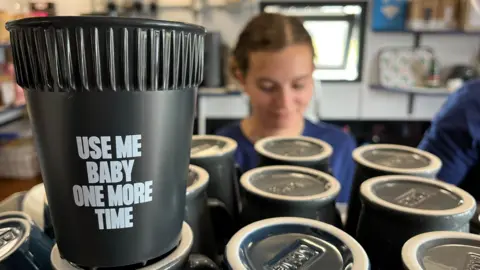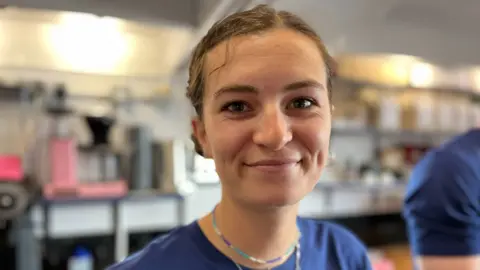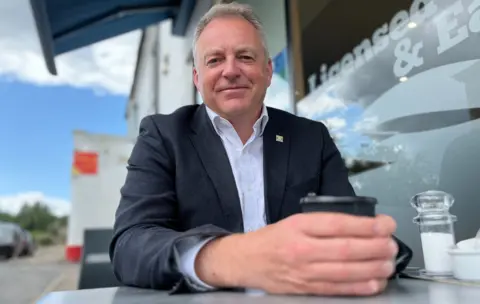NC500: Coffee cup borrowing tackles tourist route litter
 BBC
BBCTourists on the North Coast 500 are being urged to borrow cups from cafes on the route to reduce litter from single-use drinks containers.
Drivers on the popular 500-mile tour often break up their journey by buying takeaway drinks to have in the car.
The Highland Cup Movement allows customers to take a reusable cup for free at one outlet and return it to one of dozens of others close to the route.
They have two weeks to return the cup and lid to avoid being charged £4.
It comes as the Scottish government publishes its litter strategy which pledges more support for targeted interventions like this.
In the next year it also plans to introduce fines on the registered keepers of vehicles from which littering offences are committed.
Tougher penalties are also planned with the fine for flytipping increasing from £200 to £500, while exploring the option or raising it further to £1,000.
Keep Scotland Beautiful - which declared a "litter emergency" in December - said the North Coast 500 scheme was the sort of project needed to tackle the problem.

People who want to take part in the voluntary cup movement scheme have to register their details on an app which they then use to scan a QR code on the lid.
So far, 25 businesses have signed up from Applecross to Castle of Mey near Thurso.
Laura Thompson owns Slaughterhouse Coffee which sits by the slipway for the small car ferry running between Cromarty and Nigg.
She acknowledges that single-use coffee cups are a big problem for the hospitality sector and that they need to promote alternatives to customers.
Laura said: "Some are really keen. I think those are the ones that are already aware of how much of an issue disposable cups are. Others, I think it'll take a bit more time."
'More carrot than stick approach'
She thinks that the more reluctant customers will come on board once they see what a difference the pilot project can make.
About 200 million disposable coffee cups are used each year in Scotland alone, according to the Scottish government.
They have been planning to introduce a levy of around 25p to use them.
But the NC500 scheme uses more of a carrot than a stick approach.
Tara Jaffrey runs Corner on the Square café in Beauly and had already been looking for ways to reduce her business waste.
In the summer months, she supplies up to 1,000 take-away drinks per week.
"Even if only five or 10 customers a day use that scheme, over the course of the week and then over the year it's a massive number of people."

The pilot scheme - organised by Keep Scotland Beautiful (KSB) - will run for an initial six months over the summer.
There are currently 700 cups in circulation across the 25 businesses.
Similar schemes are in operation in some European cities, particularly in Germany, but not across such a large rural area.
KSB said the litter problem had been in "sustained decline" for almost a decade to the point, in December 2022, where it declared a 'litter emergency.'
Without significant intervention, KSB chief executive Barry Fisher believes the issue will get worse.
He said: "We definitely can come back from it but every person needs to start thinking about what they are personally doing with the waste that we generate throughout the year."
The Scottish government said its six-year plan for tackling litter and flytipping recognised that it was a blight on our streets, communities and countryside.
Circular Economy minister Lorna Slater believes targeted action - backed by enforcement - will drive behaviour change.
She said: "It is part of a wider package of measures to tackle Scotland's throwaway culture, including becoming the first nation in the UK to ban some of the most problematic single-use plastics, a commitment to introduce a charge on single-use cups, the introduction of a Deposit Return Scheme, and reform of extended producer responsibility for packaging."
